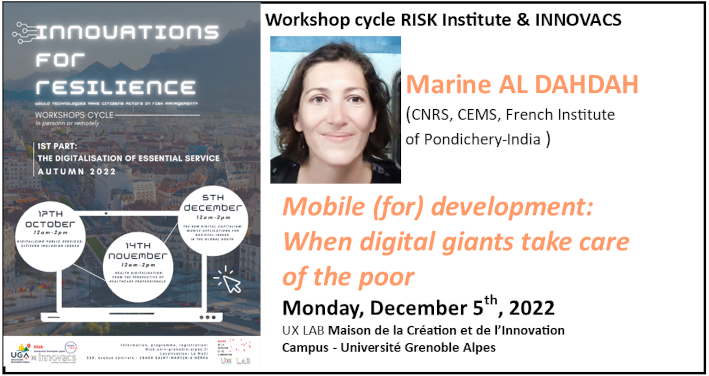- Share
- Share on Facebook
- Share on X
- Share on LinkedIn
Workshop, Encounter/Debate / Event in English, Innovations for Resilience, Partnerships, Research
On December 5, 2022

From September 2022 to July 2023, one Monday/month during lunch break, the Risk Institute proposes with INNOVACS a research workshop cycle opened to all academics and professionals to address the issue of citizens’ involvement in vulnerability reduction and risk management through easy-to-use, and light technologies.
Registration is free but mandatory. Remote access is possible on request.
1ST PART OF THE CYCLE: THE DIGITALISATION OF ESSENTIAL SERVICES
WORKSHOP #3 - DECEMBER 5TH, 2022 - 12:00 NOON
MOBILE (FOR) DEVELOPMENT/ WHEN DIGITAL GIANTS TAKE CARE OF THE POOR
Marine AL DAHDAH (CNRS, CEMS, French Institute of Pondichery-India)
Language: English
The idea of using low technologies to provide access to essential goods was developed in the South, perhaps even before in industrialized countries. In contexts of structural weakness of infrastructures, these solutions quickly appeared as low-cost and easy to implement answers in line with the concept of empowerment cherished by developers. But the stakes in terms of economic model are essential and the use more disturbing than it seems.
Marine Al Dahdah ( (CNRS, CEMS, French Institute of Pondichery-India) will present her book: Mobile (for) Development: When Digital Giants Take Care of Poor Women. Elements in Global Development. Cambridge University Press, 2022.
Language: English
Summary

WORKSHOP CYCLE 2022-2023 - FULL PROGRAM
1st part of the cycle: The digitalisation of essential services
. October 17th, 2022
The digitization of public action / Citizens inclusion issues
Périne BROTCORNE, (Louvain University, Belgium)
(FR - English Material)
. November 14th, 2022
E-Health & Health Crisis: Teleconsultation Devices - Caregivers’ perspectives
Marie BERTHOUD (Lille University, France)
(FR - English Material)
. December 5th, 2022
Mobile (for) development : when digital giants take care of the poor.
Marine AL DAHDAH (CNRS, CEMS, French Institute of Pondichery-India)
(English)
2nd part of the cycle: Involving users? New trends in design methodologies
. Is frugal innovation more inclusive ?
. Simulations, experimentations, serious games and living labs: enrolling and observing vulnerable users.
. Low-techs, citizen innovations and the commons.
(Detailed program coming soon)
3rd Part of the cycle: Innovations, vulnerabilities and territories
. Thermalism, vulnerability and territories
Adrien SONNET (LACES Lab., Bordeaux University)
(FR - English Material)
. Innovations for vulnerable territories: sustainable development as an opportunity for new patterns?
Nicolas BUCLET (PACTE Lab., Grenoble University)
(English)
Workshop cycle conclusive conference
Gérald GAGLIO (sociologist of innovations)
(English)
RISK INSTITUTE: THE “INNOVATIONS FOR RESILIENCE” CLUSTER OBJECT
Coordination: Jean-Luc Bosson (TIMC-Imag), Jean-François Boujut (G-Scop), Céline Cholez (PACTE)
The cluster Innovations for resilience is a multi-disciplinary research group (sociologists, geographers, historians, engineers, climatologists and geo-scientists, hydrologists, architects, physicians, managers, communicators...) involved in undesrtanding the spreading of "people-centered innovations" to make them actors of crisis management and enhance their resilience.
Actually, in a few years, many “smart” innovations explicitly dedicated to different types of crises management or vulnerabilities reduction have been developed by public and private players worldwide in order to integrate public concerned or recognized as concerned. The cluster research mainly tackles smart, decentralized, often small, and “easy-to-use” innovations that for some, benefit from the recent progress of microelectronics and digital industries, from the trend of artificial intelligence and the internet of things. This contributes to widespread agile and economical solutions (small sensors, mobile apps, for example) that, coupled with institutional innovations, are expected to complete or replace institutional and experts centered traditional responses.
Many of these innovations originate in a public-private partnership; they concern many different geographical and political territories; some are market-driven, some are “bottom-up” (emerging from a grass-root innovation process). The public concerned, the “end-user,” can both appear as a target and a producer of information (Al Dahdah, 2019), sometimes through a community commitment but also as a human virtual or physical sensor (Goodchild, 2007).
A significant issue the cluster addresses is analyzing the extent to which these innovations drive a change in the risks’ governance with a more inclusive perspective.The cluster’s program mainly addresses issues related to:
- change in design methodologies (users’ centered, frugal, grass-roots innovation) at all stages from idea to prolonged usage with a challenge about the integration of learning from crisis and vulnerability experiences approaches (as recommended in risk cycle management) and long and ordinary existing practices regarding risk phenomenons;
- legal and public policy dimensions especially privacy regarding data capture, responsibilities’ transfer, and insurance regime implications, market regulations for public stakes (health, natural and industrial risks) and sustainable economic model;
- change in risks’ expertise role, in experts’ position and capacities of action confronted to the emergence of new actors and possible change in institutional and power relations.
The cluster Innovations for resilience lead research projetcs (master, phd, seniors researchers), in partnerships with different territories, foster new partenerships and provides scientific animation on these topics toward Grenoble research communities but also internationally: Kyoto University-Japan, Swansea University-Wales, Denver Colorado University (USA), the International Center for Frugal Innovation (Delft, Leiden et Rotterdam Universities, Nederland).
INNOVACS
The Research Federation INNOVACS ("Innovation, Knowledge, Society" - Université Grenoble Alpes, CNRS, Grenoble INP) brings together 18 laboratories in the humanities, social sciences and engineering sciences. This scientific community develops interdisciplinary research on innovation through human and societal issues.
Its missions: To promote interdisciplinary research on innovation from the perspective of social and human issues to constitute new disciplinary networks around the issues of innovation.
Its actions: research project engineering, scientific coordination of the community, communication with civil society players and support for the valorization of research and transfer.
Date
Noon - 1:45 PM
Localisation
Location
©UGA
Maison de la Création et de l’Innovation
Room 002
339 Av. Centrale
38400 Saint-Martin-d'Hères
Access
Tramway B & C - Station Gabriel Fauré
- Share
- Share on Facebook
- Share on X
- Share on LinkedIn


